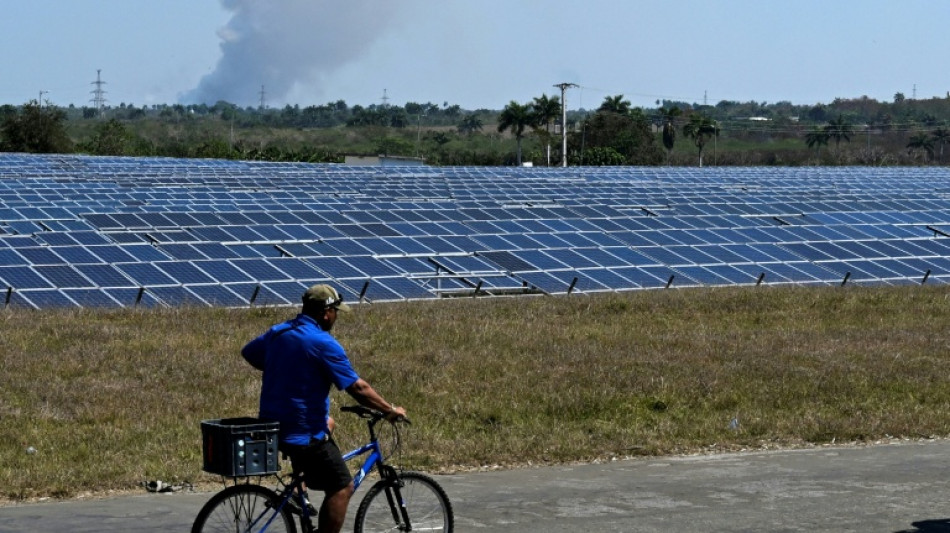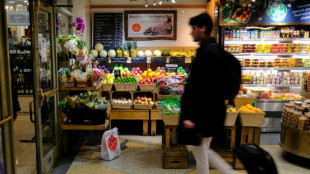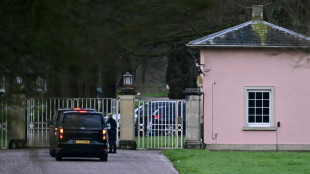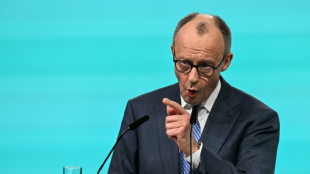
-
 German broadcaster recalls correspondent over AI-generated images
German broadcaster recalls correspondent over AI-generated images
-
US Supreme Court strikes down swath of Trump global tariffs

-
 England's Itoje says managing 'emotional turmoil' key to 100 cap landmark
England's Itoje says managing 'emotional turmoil' key to 100 cap landmark
-
Trump says weighing strike on Iran as Tehran says draft deal coming soon

-
 Tudor is '100 percent' certain of saving Spurs from relegation
Tudor is '100 percent' certain of saving Spurs from relegation
-
Azam dropped for scoring too slowly, says Pakistan coach Hesson

-
 Stocks volatile after soft US growth data, court ruling against tariffs
Stocks volatile after soft US growth data, court ruling against tariffs
-
Italy bring back Capuozzo for France Six Nations trip

-
 From Malinin's collapse to Liu's triumph: Top Olympic figure skating moments
From Malinin's collapse to Liu's triumph: Top Olympic figure skating moments
-
Arteta urges Arsenal to 'write own destiny' after title wobble

-
 Ukraine Paralympics team to boycott opening ceremony over Russian flag decision
Ukraine Paralympics team to boycott opening ceremony over Russian flag decision
-
Wales captain Lake wants fans to bring 'noise' against Scotland

-
 Skier Vonn's Italian hospital a hotbed of men, sister says
Skier Vonn's Italian hospital a hotbed of men, sister says
-
India target S.Africa top order, Abhishek to come good: bowling coach

-
 Carrick praises Man Utd 'diversity' after Ratcliffe's immigrant rant
Carrick praises Man Utd 'diversity' after Ratcliffe's immigrant rant
-
I never thought it would be hit, says 'Scream' creator 30 years later

-
 AI summit statement delayed to 'maximise' signatories: India
AI summit statement delayed to 'maximise' signatories: India
-
Barcelona's Sagrada Familia basilica hits peak height

-
 Milan sprints to second straight UAE stage win as Tiberi keeps lead
Milan sprints to second straight UAE stage win as Tiberi keeps lead
-
US GDP growth misses expectations as Trump blames shutdown

-
 Benfica investigate video of fans' monkey gestures
Benfica investigate video of fans' monkey gestures
-
French minister pledges tight security at rally for killed activist

-
 Guardiola 'couldn't care less' about Arsenal stumble in title race
Guardiola 'couldn't care less' about Arsenal stumble in title race
-
UK police search property as royals reel from Andrew's arrest

-
 Germany's Merz to visit China next week
Germany's Merz to visit China next week
-
Kompany says Mourinho made 'huge mistake' in Vinicius racism row

-
 X appeals EU's 120-mn-euro fine over digital content violations
X appeals EU's 120-mn-euro fine over digital content violations
-
Galthie recalls hulking locks Flament, Meafou for Italy

-
 Turkey, Saudi sign major solar power deal
Turkey, Saudi sign major solar power deal
-
US Olympic freeskier Hess embraces 'loser' tag after Trump blast

-
 European stocks rebound, oil prices ease after US-Iran volatility
European stocks rebound, oil prices ease after US-Iran volatility
-
'Alpha male' AI world shuts out women: computing prof Hall

-
 New Zealand freestyle skier Ives in hard Olympic crash
New Zealand freestyle skier Ives in hard Olympic crash
-
New Zealand must adapt quickly to Sri Lanka wickets: Chapman

-
 Thai activist's jail term for royal insult extended to 30 years
Thai activist's jail term for royal insult extended to 30 years
-
Families of Duterte's drug war victims eye Hague hearing with hope

-
 India chases 'DeepSeek moment' with homegrown AI
India chases 'DeepSeek moment' with homegrown AI
-
UN touts panel for 'human control' of AI at global summit

-
 Ukraine Paralympics team to boycott Opening Ceremony over Russian flag decision: statement
Ukraine Paralympics team to boycott Opening Ceremony over Russian flag decision: statement
-
UK monarchy reels from Andrew's stunning arrest

-
 Somaliland, where Muslims love Israel
Somaliland, where Muslims love Israel
-
Florida airport to be renamed after US President Donald Trump

-
 Fans flock to Japan zoo to see viral baby monkey Punch
Fans flock to Japan zoo to see viral baby monkey Punch
-
Stocks mixed, oil rises after Trump Iran threat

-
 Outspoken Laos lawmaker's election exit sparks rare dissent
Outspoken Laos lawmaker's election exit sparks rare dissent
-
Kim Jong Un vows to boost living standards as he opens rare congress

-
 Shepherd hat-trick to Samra ton: Five top T20 World Cup performances so far
Shepherd hat-trick to Samra ton: Five top T20 World Cup performances so far
-
Zimbabwe surprise as T20 World Cup Super Eights begin without Australia

-
 Victorious Takaichi promises 'strong and prosperous' Japan
Victorious Takaichi promises 'strong and prosperous' Japan
-
Ex-South Korea leader apologises for martial law crisis


Cuba looks to sun to solve its energy crisis
Not far from the ruins of an unfinished nuclear power plant in the Cuban province of Cienfuegos, hundreds of workers are hastily installing 44,000 solar panels as the island seeks once again to reduce its reliance on oil to escape an energy crisis.
Forty years ago, the solution was thought to be Russian nuclear energy. This time, it is the sun. With help from China.
Dozens of containers with Chinese inscriptions are lined up at the "La Yuca" photovoltaic park, where forklifts loaded with solar panels weave between the concrete frames that will hold them.
"We are laying wires, digging trenches and installing panels," a worker on the project, to be completed in May, explained of the frenetic activity.
Cuba, an island of some 10 million inhabitants, remains highly dependent on fossil fuels to operate its eight outdated thermoelectric power plants, most of them online since the 1980s and '90s and prone to frequent breakdowns.
The communist government has approved the construction of 55 solar parks by 2025.
Five of them will be in the central province of Cienfuegos, that also hosts an industrial port and a refinery, and was chosen in the 1980s to host a Soviet-funded nuclear power plant that was aborted mid-build when the USSR collapsed.
Cuba's fragile electric grid has gone offline four times in the past six months, plunging the majority of the country into darkness, sometimes for days on end.
Most of the country faces near-daily outages blamed mainly on fuel shortages.
"More than half of all the fuel consumed by the country goes towards electricity production," Energy and Mines Minister Vicente de la O Levy recently told state-run newspaper Granma.
- Millions of dollars -
Most of the oil has come from Venezuela which, like Cuba, is under US sanctions and has seen the administration of President Donald Trump recently revoke licences that allowed transnational companies to extract crude there.
The country also uses floating electric plants rented from a Turkish company, and generators fueled by crude oil even as there is not enough petrol for the island's cars, tractors and ambulances.
The country produces about a third of the fuel it consumes, and buys the rest.
De la O Levy has said solar parks are at the heart of Cuba's renewable energy goals because the "investments are cheaper, they are built more quickly, and can be spread throughout the country."
The communist island, grappling with its worst economic crisis in decades, aims to generate 12 percent of its energy from renewable sources by 2025 and 37 percent by 2030.
By the end of this year, it hopes to produce 1,200 MW in solar energy per day -- almost equal to its daily electricity deficit of 1,500 MW.
The ambitious project requires an investment of several million dollars, and with few Western friends, Cuba has gladly accepted support from what the presidency described in February as "the sister nation of #China."
A total cost estimate has not been made public.
- 'The quickest way' -
Just 15 kilometers (9.3 miles) from "La Yuca" stands an imposing steel dome designed to protect what was going to be a nuclear reactor -- the last large-scale attempt to change Cuba's energy mix.
On its thick concrete walls, Russian inscriptions are still visible.
The project was canceled in 1992 by then-president Fidel Castro after the fall of the USSR, a Cuban ally, which had largely financed the project and provided physicists and engineers.
Eliecer Machin, a thermophysicist trained in the USSR who still lives in the "nuclear city" built to house the personnel of the would-be power plant, recalls the "hard blow" when it was shuttered.
The 60-year-old now makes a living as a pig farmer.
Today, as a result of mistakes made in the past, he said, solar is "the quickest way to obtain energy."
University of Texas researcher Jorge Pinon said the solar energy would mean little if Cuba doesn't have batteries to store it for use in periods of darkness.
M.A.Colin--AMWN

